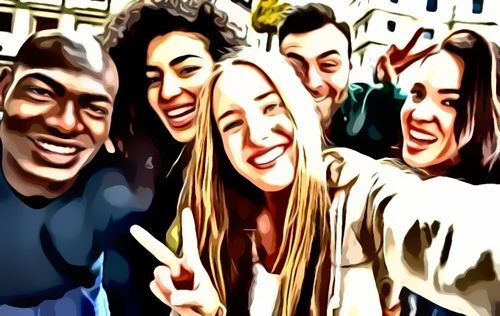IELTS Topic: Friends

VOCABULARY & EXPRESSIONS
Go over the following vocabulary and expressions with your tutor. Read the word/expression and definition out loud, and your tutor will go over anything you do not understand. Practice creating a sentence or two to make sure you know how to use the word/expression properly
Vocabulary/ Expressions
to enjoy someone’s company: (expression)
to like spending time with someone.
My friend John and I really enjoy each other’s company.
to drift apart: (expression)
to become less close to someone
My friend Sally and I have not seen each other in years, as we have drifted apart.
to have a lot in common: (expression)
to share similar interests
My friend Alex and I have a lot in common as we like the same kinds of activities.
to go back years: (expression)
to have known someone for a long time
Sam and I go back years, as we have been friends since high school.
to have ups and downs: (expression)
to have good and bad times
My friends and I have our ups and downs, but through it all, we grew to be better friends.
to keep in touch with: (expression)
to keep in contact with
My friends from high school and I still keep in touch as we often communicate online even though they live in another city.
to lose touch with: (expression)
to not see or hear from someone any longer
My past colleagues and I have lost touch with each other, as we don’t communicate a lot anymore since I have left the company.
to strike up a relationship: (expression)
to begin a friendship
I met a new colleague yesterday, and I would like to strike up a friendship with him as I really like his personality, and we have a lot in common.
to be well matched: (expression)
to be similar to…
My friends and I are well-matched as we share common interests, but we also have our differences.
to work at a relationship: (expression)
to try to maintain a positive relationship with someone
My friends and I always try to work at our relationships, as we believe that will help us build a stronger bond with each other.
PART 1 QUESTIONS
Introduction and interview (4-5 minutes)
Here are possible questions that might come up during the test. Go over them with your tutor.
In the first part, the examiner will ask you a number of general questions
Do you have many close friends?
Do you think friendship is important?
Which do you prefer: to spend time with a friend or spend time alone?
What kind of people do you like to have as friends?
Are your friends mostly your age or different ages?
Do you like face-to-face conversations with people?
Are most of your friends from school or outside school?
How often do you meet with your friends?
What do you and your friends do together?
How do people in your country meet others and make friends?
Do adults and children make friends in the same way?
Do you think it is possible to become real friends with people you meet on the internet?
Useful Tips:
You can say about the main points by including factual information such as best friend’s name, (Lee) their profile, (software developer), their workplace (Google Inc.), when your friendship started (2002, in grade 2 )
Connectives:
You can use connectives to connect your ideas together:
It just happened that
Once upon a time
It was when
From then onwards
Moreover
Apart from this
Other than this
In spite of this
You can use adjectives to add value to your speaking:
Extremely honest
Trustworthy
Straight forward
Kind-hearted
PART 2 QUESTIONS
Individual long turn (3-4 minutes)
Here are possible questions that might come up during the test. Go over them with your tutor.
You will have 1 minute to prepare to speak, and then you will talk for 2 minutes, during which the examiner will not speak.
Sample A
Describe a person who you have met recently, and want to know more about him/her in order to become friends.
You should say:
Who this person is
When and where you met this person
What you did or talked about
Why you want to become friends with this person
Sample B
Describe a friend who has played an important part in your life.
You should say:
how you met this person
how long you have known this person
the kind of thing you do or did with them
And explain why this person has been important in your life
Sample C
Describe a friend from your childhood.
You should say:
Who he or she is
How and where you met
Explain how you became friends,
If you are still in touch with this person
PART 3 QUESTIONS
Two-way discussion (4-5 minutes)
Here are possible questions that might come up during the test. Go over them with your tutor.
In the last part, you will talk with the examiner about issues related to the topic on the card.
“Generally, are friends or family more important to people your age?”
“Who do people tend to speak to about their personal problems?”
“What do you think the most important quality in a friend is?”
“Do you have any friends now from when you were very young?”
“Do you think it is possible for men and women to be just good friends?”
“Do you think it is better to have a few good friends or many different friendships?”
“For you, what is the difference between a friend and an acquaintance?”
“Do you think teachers should try to be a friend to their students, or should they keep a distance?”
“Can you give me some examples of what a friend could do that would make you break off the friendship?”
“Would you say anyone in your family is also your friend?”
“Which friends you have now do you think will continue to be your friend when you are much older?” (“Why do you think so?”)
“Do you think you will have more friends or fewer friends as you get older?”

